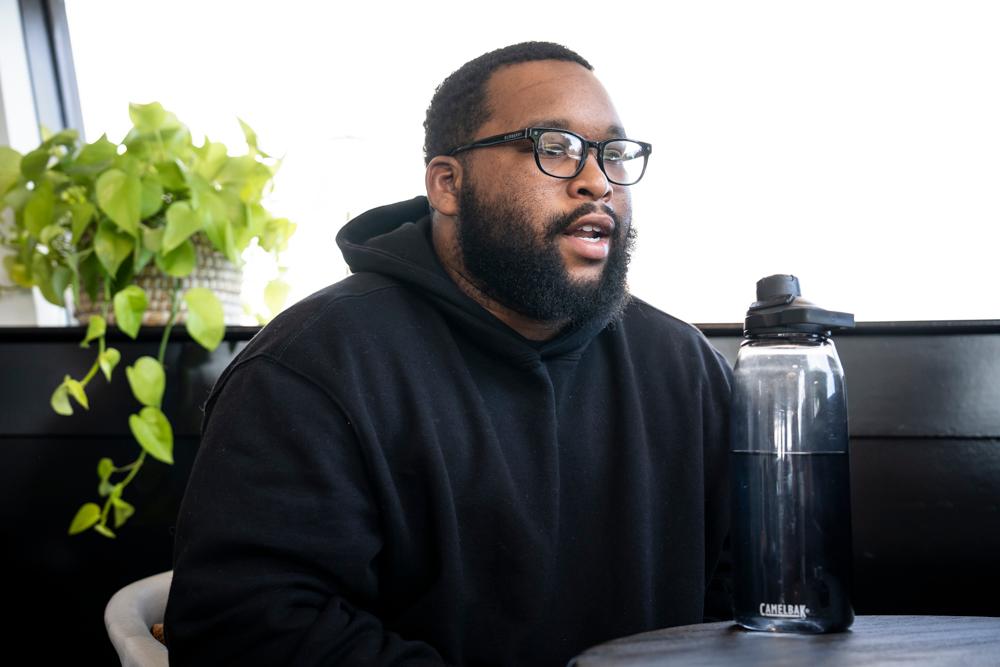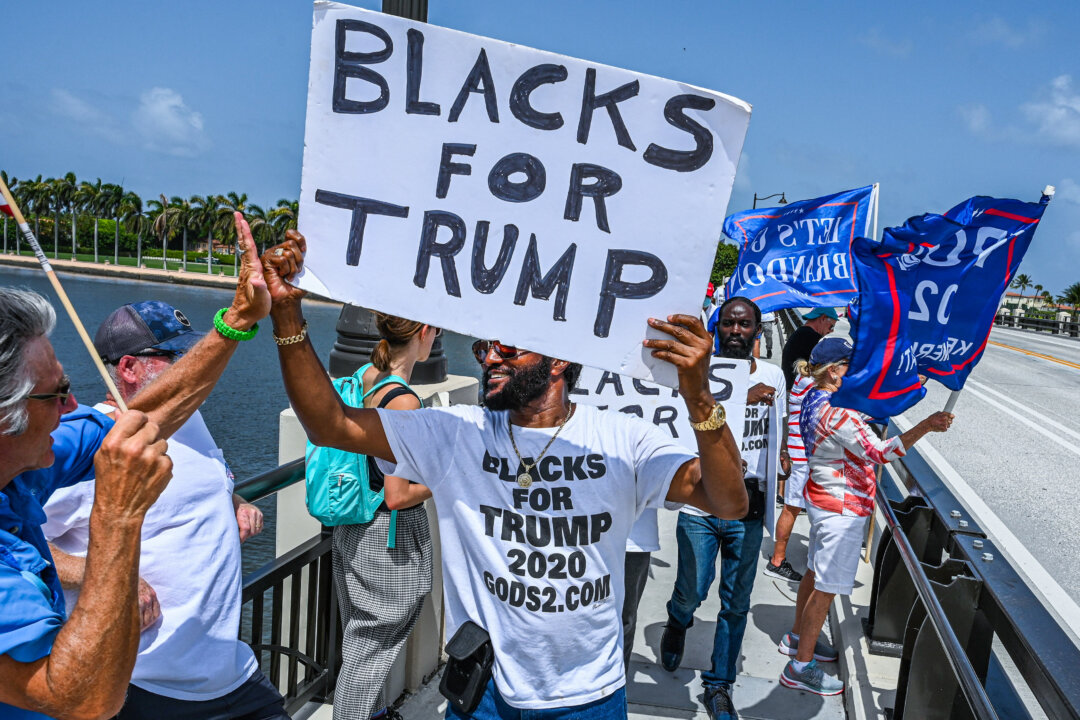Vice President Kamala Harris is underperforming among black voters, and black youth in particular, compared to Obama and Biden.
There has been a surge in support for Republican candidates among black male voters, a trend that has been building since 2008.
This year, many expected that black male voters would rally behind Kamala Harris, the first woman of color to achieve the historic milestone of becoming a presidential nominee. However, concerns voiced by Democrats, including former President Barack Obama, suggest that this is not happening.
A closer examination of this crucial voting bloc reveals more complex reasons behind their shift away from the Democratic Party.
Recent polls show that former President Donald Trump has made inroads with black voters, particularly young black men.
Mark Ruff, a 26-year-old African American from Birmingham, Michigan, says he is “definitely” witnessing this trend firsthand. He says that many peers in his community are considering voting for the Republican candidate in the upcoming election.
Ruff describes himself as an undecided voter because he feels he hasn’t done enough research about both candidates to make an informed decision. However, he observes that some black voters are frustrated with Democratic politicians.
“It’s been years and years, and there are still issues that still haven’t been taken care of,” Ruff told The Epoch Times.
So, they think it’s worth considering what the other side has to offer, he added.
His friend, Jaleel Anderson, 25, also from Birmingham, echoed the same sentiment.
Anderson, who is also an African American, shared his personal experience of growing up in a household that supported the Democratic Party, where his parents’ voting habits influenced his opinion as a child.
As he grew up, he and his friends believed they would naturally support Democrats due to family tradition, without giving it much thought.
“I’m 99 percent sure my mom voted for Al Gore and 100 percent sure she voted for Obama,” Anderson told The Epoch Times, jokingly.
“Now, I see a lot of undecided voters, at least among the people I know, and they are open to hearing what the other side has to say.”
Anderson cited education and the economy as his top issues. He describes himself as an undecided voter, though he leans toward conservative viewpoints, largely influenced by his strong Christian faith.
“I think this election, you’re probably not going to have a lot of black folks leaning left, and if not this election, the next one, for sure,” Anderson said. “You might see more of a polarizing shift in terms of political alignment within the African American community.”
Recent polls show that Vice President Harris is struggling to gain the same level of support from black voters as her predecessors, Joe Biden and Barack Obama.
While most black voters (63 percent) plan to support Harris in this year’s election, black men and younger black voters are most likely to be undecided or Trump supporters, according to a recent survey by the National Association for the Advancement of Colored People (NAACP).

The survey revealed that 58 percent of black men and 67 percent of black women support Harris. Among black men under 50, support for her drops to just 49 percent. In contrast, 26 percent of black men under 50 favor Trump.
Black voters have historically shown strong support for the Democratic Party, but the backing among black men has steadily declined over time. For instance, in 2008, Barack Obama received 95 percent of the black male vote, while Joe Biden’s support among this voter group was 79 percent in 2020, according to exit polls.

‘It’s All About the Economy’
Many believe that a sizable shift among black voters to Trump could spell trouble for Harris in battleground states, especially in Georgia and North Carolina.
For example, in Georgia, black Americans represent one-third of eligible voters, the highest percentage among swing states. Biden won the state by a razor-thin margin of nearly 12,000 votes.
This creates a major challenge for Harris if she cannot achieve the same level of black voter turnout that Democrats secured in 2020.
Joe Lou, a 68-year-old Uber driver from Atlanta, Ga., is backing Trump. Lou, who is an African American said that many in his community are planning to vote for the former president.
“It’s all about the economy,” he told The Epoch Times. “People don’t agree with focusing on transgender and migrants.”
Lou believes most Trump voters in his community are entrepreneurs.
“We don’t want to be taxed to death just because we worked hard and made it,” he said.
He also noted that many black Americans are hesitant to express their support for Trump due to fear of retaliation.
He particularly reacted to the recent remarks by Obama, saying, “I felt that he had no right to tell black men how to vote.”
Obama on Oct. 10 criticized black men for making excuses not to vote for Harris.
“We have not yet seen the same kinds of energy and turnout in all quarters of our neighborhoods and communities as we saw when I was running,” he said during a campaign event in Pittsburgh.
“That seems to be more pronounced with the brothers,” Obama continued, referring to African American men.
“Part of it makes me think that, well, you just aren’t feeling the idea of having a woman as president. And you’re coming up with other alternatives and other reasons for that,” he said, adding that choosing Trump over Harris based on gender is “not acceptable.”

Some black men state that their decisions not to vote for Harris aren’t influenced by gender. They prioritize economy and education as key issues and aren’t satisfied with the Democratic Party’s policies, believing they have been overlooked.
In a July report, Good Authority referenced research by Samantha Canty and Michael Tesler from the University of California, Irvine, arguing that the vice president does not sufficiently support black interests. The research found that her perceived indifference to black people’s interests has eroded her support among this key voting bloc.
According to Anderson, Obama’s speech could be particularly effective for black men who may not be familiar with Harris.
“I like that Obama guy. Yeah, let’s vote for Kamala. He’s backing her,” he suggested people might say.
Many remember Obama’s eight years in office as good years, he noted, so that message could resonate with them.
On Oct. 14, Harris introduced her “Opportunity Agenda for Black Men” in a bid to narrow the gender gap in support for her among black voters.
She proposed to provide 1 million fully forgivable loans of up to $20,000 to black entrepreneurs and new avenues to help black Americans succeed in the legalized cannabis industry. She also plans to support a cryptocurrency regulatory framework to protect black men who invest in crypto.
‘He Said the Quiet Part out Loud’
Democratic strategist Theryn Bond praised Obama’s recent remarks about black male voters.
“He said the quiet part out loud,” she told The Epoch Times. “It takes a courageous person to say the thing that so many are thinking, but for whatever reason are afraid to say. And he did that in that moment.”
Bond also noted that there will always be naysayers when someone speaks the truth.
“There are things that he said that people could resonate,” she added.
Bond also acknowledges that black men often feel underrepresented when it comes to policies. This election cycle, she said, voters are increasingly demanding clarity on how candidates’ policies address their needs and concerns.
Black male voters total 16.2 million, accounting for just under 7 percent of the nation’s eligible voters, according to the Pew Research Center.
While only 5 percent of black men voted Republican in 2008, Trump made inroads with this voter bloc, securing 13 percent of their vote in 2016 and 19 percent in 2020. And according to an NAACP survey, 26 percent of black men currently favor Trump.
Jordan Johnson, a 31-year-old warehouse director from Jacksonville, Fla., said he’s unlikely to vote, but if he did, he would choose Trump.
The African American expressed frustration with Harris, saying that she avoids directly answering questions about how she would improve the economy or make the country better.
However, Robert Edmond, a public health professional from Atlanta, Ga., doesn’t share the same sentiment. He has already voted for the vice president in early voting.
“I am very proud and supportive of her policies,” the 37-year-old African American told The Epoch Times.
“I think she’s going to be influential in helping the middle class. I think she’s going to be a good president for incorporating inclusivity and helping stabilize our country,” Edmond said.
He also said that most of his peers see Harris as a competent and experienced politician.

Sen. Raphael Warnock (D-Ga.) told CBS’s “Face the Nation” on Oct. 20 that Democrats need to “keep doing the work” to overcome concerns about black voter turnout in the battleground state.
“Oh, we just have to keep doing the work. And the good news is, that’s exactly what Kamala Harris and Tim Walz are doing. They’re not taking anything for granted,” Warnock said.
According to the RealClearPolitics average, Trump is pulling ahead in all seven key battleground states, including Georgia, as of Oct. 20.
The former president and his allies pitched to African American voters in Atlanta on Oct. 15, the record-breaking first day of early voting in Georgia.
A mecca for black Americans, Atlanta is also the largest city in a crucial state for both campaigns.
Michaelah Montgomery, a Georgia activist who spoke ahead of Trump at the Cobb Energy Performing Arts Center, questioned recent comments from Obama.
“How dare you single out black men and act like it’s their fault?” Montgomery said of Obama’s remarks.
A group called “The Black Men for Trump Advisory Board” also issued a statement on Oct. 12, calling Obama’s remarks “deeply insulting.”
“Black Americans are not a monolith, and we don’t owe our votes to any candidate just because they ‘look like us,’” the group said.
On Oct. 20, coinciding with her 60th birthday, Harris visited Georgia to appeal to early voters in this key battleground state, making stops at two churches.
During her speech at New Birth Missionary Baptist Church in Stonecrest, Harris aimed her message at black voters, emphasizing the significance of the moment in U.S. history.
“In this moment, our country is at a crossroads, and where we go from here is up to us, as Americans and as people of faith,” she said. “And now we ask a question: We face this question, what kind of country do we want to live in? A country of chaos, fear, and hate, or a country of freedom, compassion, and justice.”
Nathan Worcester contributed to this report.

